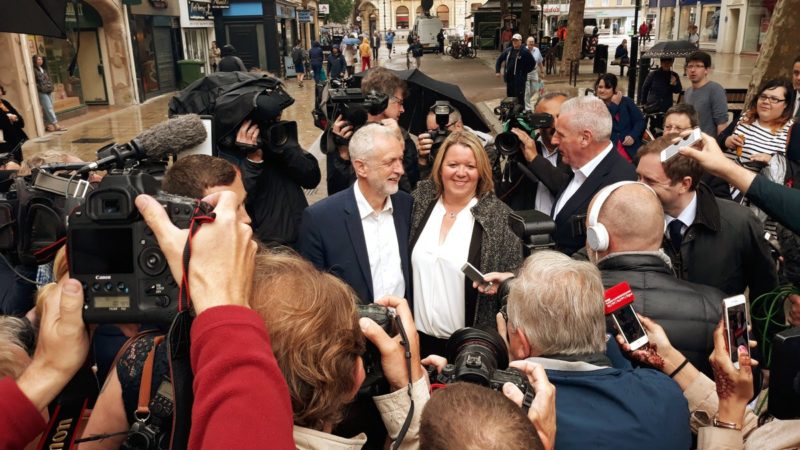
Labour’s Lisa Forbes is the new MP for Peterborough. She won the by-election yesterday with 30.9% of the vote, beating the Brexit Party, which won 28.9%. The Conservatives were pushed into third place in what has been until now a Labour-Tory marginal, securing 21.4%, and the Lib Dems came fourth with 12.3%. With 863 votes in it, Forbes has slightly improved on Fiona Onasanya’s majority of 607, but Labour’s vote share is down from 48.1% to 30.9%.
This is bad news for the Brexit Party, particularly as most commentators (and LabourList readers!) had expected them to get their first MP elected. If Nigel Farage’s party can’t win a very marginal 2016 Leave seat vacated by an ex-Labour MP who was booted from office after going to jail… where can they win? Their leader arrived in the city proudly yesterday, but apparently left the count through a back door just minutes before the result was announced. Everyone in the Labour Party is delighted to have seen him off.
But not everyone in Labour is celebrating. The Jewish Labour Movement said it wouldn’t be campaigning in this by-election after it emerged that Forbes had liked a Facebook video post with antisemitic text, for which she apologised, and signed a letter opposing the International Holocaust Remembrance Alliance definition of antisemitism. MPs including Jess Phillips and Wes Streeting are tweeting this morning that her candidacy shows “antisemitism is becoming normal in the party”. Others, such as Louise Haigh, say they know Forbes will “engage and learn” and “can be a truly ally”.
This morning, JLM has issued a call for Forbes to have the party whip suspended “immediately”. A spokesperson said: “Labour has consistently failed to take a zero tolerance approach to anti-Jewish hate… Labour’s newest MP is a perfect example of this… Given her previous rejection of IHRA, Ms Forbes should have the whip suspended immediately. This would show how urgent and necessary the EHRC’s investigation into Labour’s institutional racism is. The party is simply incapable of rooting out hate by itself.”
Apart from the deepening of party divides over antisemitism, what does the result mean for Labour and what will it take away from the victory? First, when it comes to keeping out popular but only recently formed parties, historical data is crucial. Labour had worked the seat for years, identified its core vote and was prepared to run a slick get-out-the-vote operation. Turnout was 48.4%, which is good for a by-election. That factor was more important than ever in this vote, as promises were holding up and it was chiefly a matter of getting people to the polls. It’s probably to safe to assume that they were motivated by the Brexit Party being seen as the favourite to win (and we’ll likely see a reliance on that same tactic when Jeremy Corbyn faces a hard Brexiteer such as Boris Johnson in the next general election).
Second, this will be taken as evidence by many in the party – particularly the leadership and its allies – that an election campaign can be fought and won on local issues, even at the height of Brexit chaos and narrative dominance. Forbes’ election leaflets (see liveblog at 23.53) focussed on bins and fly tipping – national concerns were to be brought up by voters on the doorstep, only touched on by the candidate when linking day-to-day problems with widespread Tory austerity.
Third, the campaign proved that although many members are urging the leadership to take a more anti-Brexit party line Labour can still mobilise activists effectively. Momentum had a ‘plan to win’. The group estimates that it mobilised nearly 1,000 activists, who were either knocking on doors in Peterborough (helped by the Momentum Carpool to Peterborough Facebook group) or making calls remotely (using Momentum’s distributed phonebank system). Over 500 turned out for polling day. National coordinator Laura Parker said: “Face to face conversations coupled with a radical, positive message about how we will transform Britain does win hearts and minds.”
All of the above will bolster the confidence of those who support Labour’s current electoral strategy and those in the party who think Brexit should be implemented (of which Forbes suggested she was one last night). Although the position has shifted to backing a public vote on any deal, Jeremy Corbyn doesn’t want to pick the side of either the 48% or the 52% – he wants to win with a radical offer for the 99%. The leadership sees Brexit as having drawn a new fault line that misrepresents the country as being split almost in half, when in fact the real tensions are between the many (struggling under cuts) and the few (benefitting from the current economic and political settlement).
It will be argued that winning a parliamentary election based on a bread and butter issues campaign shows Labour can win when voters feel it really matters – in a Westminster poll, not European or local –and can win on its own turf, not chase the messaging of Lib Dems or hard Brexiteers. The question is whether Remain-supporting Labour members and MPs, many of whom are endorsing a key anti-Brexit motion, will be able to defeat that argument at conference in September.
Sign up to LabourList’s morning email for everything Labour, every weekday morning.



More from LabourList
Letters to the Editor – week ending 15th February 2026
‘Labour council candidates – it’s tough, but all is not lost’
‘Labour won’t stop the far right by changing leaders — only by proving what the left can deliver’